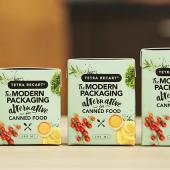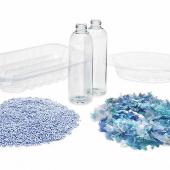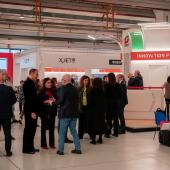Free to dream… taking the hurt out of blood testing
Outside soldiers, heavily armed police, bodyguards, Carabinieri trucks and armour-plated cars; inside, representatives of the national and regional government, pharmaceutical industry managers, press, guests of honour from the institutions and the world of manufacture, some famous names standing by, women and men of the organization busying themselves, everyone decked out elegantly and composed. This the context in which the encounter dedicated to “Health innovation and Italian manufacture” was held, thought up by the Marchesini Group and by the pharmaceutical multinational Abbott to celebrate the launch of its first blood glucose monitoring system FreeStyle Libre, capable of “improving the quality of life” of diabetes sufferers. By Stefano Lavorini
Packaging is a tool of civilisation capable of evolving, thanks to new ideas, new ways of doing, new opportunities, capable of marrying the practical/applicative needs of industry with people’s culture and needs. A technological artefact, it is by now an integral and fundamental part of the product, whether we are talking about food, cosmetics or, and all the more so, pharmaceuticals.
This is proven by what occurred February 23rd 2016, at the Marchesini Group HQ at Pianoro (BO). The atmosphere was that of great occasions, among the audience, a form of edginess due the closeness to “those that count”, but also an ill-concealed satisfaction for being there.
A few at a time, the protagonists arrived almost on time, welcomed by their host, Maurizio Marchesini (CEO of Marchesini Group and president of Confindustria Emilia Romagna): Federica Guidi (Minister of Economic Development), Stefano Bonaccini (President of the region of Emilia-Romagna), Donata Lenzi (Member of the Social Affairs Commission of the Italian Chamber of Deputies), Romano Prodi (President without complements of specification), Pat Cole and Massimiliano Bindi ( Abbott Diabetes Care), Paolo Di Bartolo, (director of the Diabetes Unit, Network Business Diabetes Clinic - Department of internal medicine Ravenna, Ausl Romagna), Rita Lidia Stara (Diabetes Federation President Emilia Romagna), Giuseppe Venturelli (Doxa Pharma), etc.
Everyone to pass the time, up until when TV head Enrico Mentana (head of TG LA 7), called upon to coordinate the interviews, after the ritual salutations started a mini-marathon, raising the curtain on a reality, which many people perhaps don’t know about: that of the routine of difficulties and hardship which diabetes sufferers have to face, forced as they are to carry out a precise self monitoring of blood glucose levels. As explained, up to 10 fingertip prick tests a day (the average is 2.4), in order to have a complete picture of blood glucose levels on which their therapy is based.
What’s new is that there is now an alternative capable of improving the quality of life of millions of children and adults, thanks to FreeStyle Libre, the device made by Abbott.
Created to replace routine blood tests, the system comprises a smallscale sensor (no bigger than a 2€ coin), to be applied to the back of the arm, that automatically measures blood sugar values night and day for 2 weeks, totally eliminating tests where one needs to prick ones fingers. The data collected by the sensor are transmitted to a touchscreen reader, capable of operating at a distance of from 1 to 4 cm also though clothing: in this way you have an immediate display of the blood sugar values, a history over the last 8 hours, as well as the display, via an arrow, of the blood sugar level trend.
As Pat Cole pointed out, Abbott managed to develop this monitoring device by starting from the basis of patients’ needs, offering a practical and discrete solution, but also enhancing therapies and thereby reducing the cost of hospitalization.
This last point emerged as an important one during the discussion, since although the price of the new device is greater than traditional methods, the benefits to patients and the collective savings of the former far outweigh the latter. The challenge, then, is to make sure that it is also accessible to those lacking the means to buy one.
On this matter, Massimiliano Bindi aims to use clinical trials to demonstrate that FreeStyle Libre is also an economically sustainable solution, capable of rationalizing healthcare costs.
Stefano Bonaccini, president of the first regional government to recognize the device’s merits, is convinced of this. This is in line with an approach that, albeit targeting the cost of drugs, does not shirk from prioritizing patients and quality of life.
These concepts were taken up by Donata Lenzi, who in her appreciation of what has already been accomplished, thinks there needs to be a greater balance between public expenditure and technological innovation.
Others chimed in as the morning progressed, unanimously underlining the immediate improvement to the quality of life for many that this innovation offers.
Mentana skillfully introduced two additional (unscheduled) voices to the conversation: that of Romano Prodi, who expressed great anxiety over the fate of Europe, which he feels seems to have «lost its soul» in its haste to balance budgets; and that of actor Maurizio Ferrini, who has recently been diagnosed with diabetes, and who delivered an enthusiastic testimonial for FreeStyle Libre.
Kudos to Maurizio Marchesini, who didn’t miss the opportunity to observe how this joint project with Abbott shows just how effective Made in Italy technology and manufacturing can be, and how necessary it is that Italy continue to do what others don’t know how to do. He also explained, with the help of a video, that the robotized plant – the only of its kind – where this revolutionary product is quickly and efficiently packaged has been designed with the help of allied industries, a valuable resource synergistically combined with the concern’s own knowhow.
Federica Guidi took his remarks as an opportunity to state how close the government is to enterprises and relate what it is doing to incentivize investment (cutting taxes) and innovation (Patent Box), toward a uniquely Italian flexibility that means doing things in an increasingly market-oriented way.
NOTE According to estimates, 415 million people worldwide, 3.5 million of whom reside in Italy, are diabetic. These figures will rise considerably in the coming years.




















